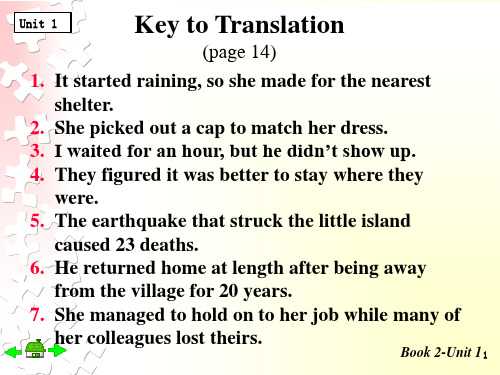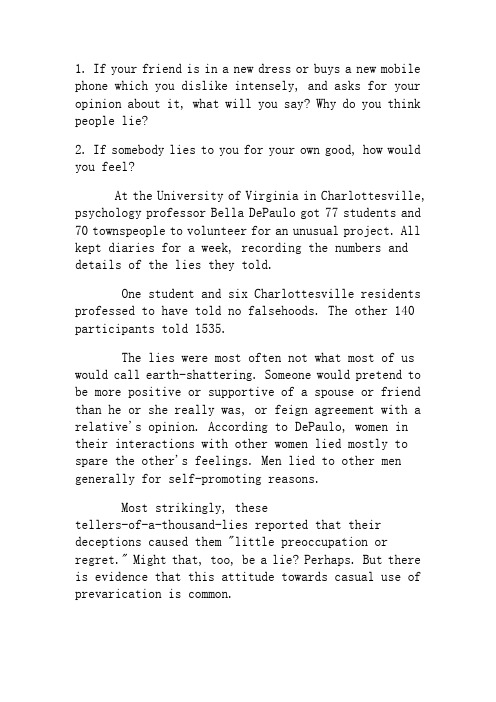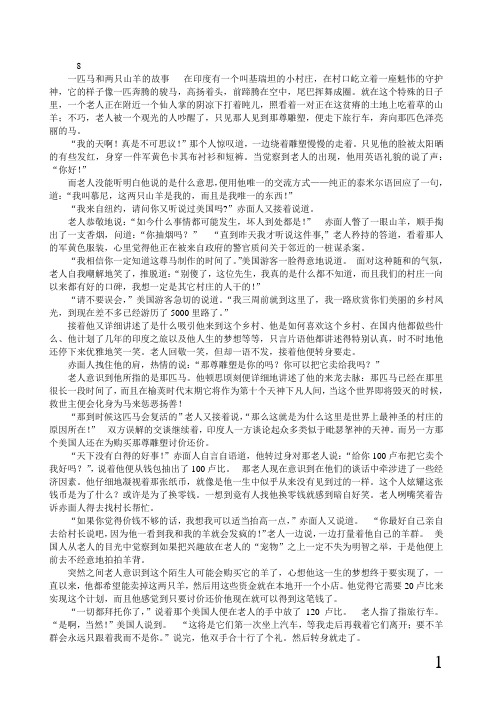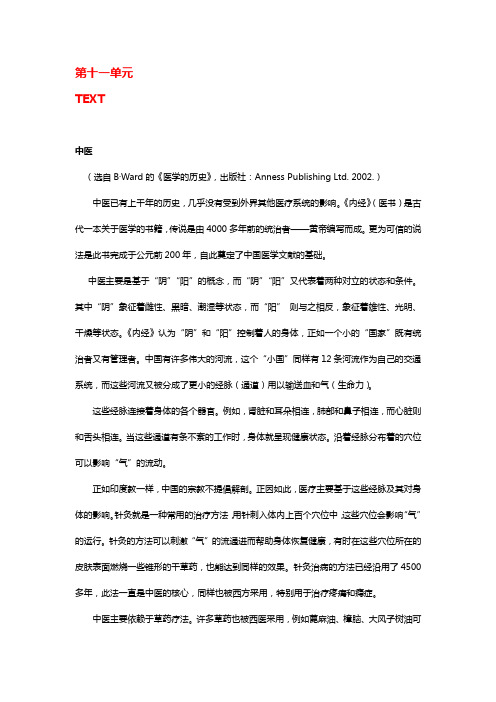综合英语教程(第三版)BOOK2-课文译文 11.第十一单元
综合英语教程第三版第二册Unit11课文重要词组单词

综合英语教程第三版第二册Unit11课文重要词组单词Unit 11Detailed study of the text1. to go through(1) to pass or complete(a stage) 经历,经受,通过(考试等)Y our suggestion has to go through several stages.(2) to undergo /suffer .He has gone through such a lot since his parents died..cf. Let’s go through(仔细检查discuss in detail)the arguments again.The police went through(search搜查) the pockets of the suspected thief.2. to be meant to do sth ----- to be supposed to do sth (to be intended to do sth )The boy is so clever that he is meant to go to the first-rate university(of our country).cf. I’m sorry if I hurt your feelings .I didn’t mean to(intend to).Y our friendship means a great deal to me.(I value it highly )3. concentrate on ----to fix one’s attention on (sth, someone or doing sth)Please be quite, I’m trying to concentrate on my work.Many firms are concentrating on increasing their markets overseas.cf. We must concentrate our efforts on(direct firmly on (a subject) (focus on ,keep on)) finding ways to reduce costs.4. to resign oneself to —to be prepared to accept (sth/doing sth often unpleasant ) 使听从于,使顺从Y ou must resign yourself to your fate .你必须任命听天由命。
综合英语教程2(第三版)课后翻译整合版PPT课件

if you feel like it. 6. He is always interfering with our plan. 7. Owing to a mechanical problem, they were
2. A writer should draw on his imagination and experience in his writing.
3. After a promising start, the company ran into heavy debt. 4. “Have you drawn up that list of names yet?”
footsteps and take over the family business when she's old enough. 6. He had to get off his bike and push it up the hill. 7. This pair of gloves will protect your hands against the cold.
4. They figured it was better to stay where they
were.
5. The earthquake that struck the little island
caused 23 deaths.
6. He returned home at length after being away
最新综合英语教程2第三版课文翻译资料

《综合英语教程》第二册课文、扩展阅读课文译文Unit 1Text等候的人们我坐在一个机场,观察着等候所爱之人到达或离开前最后一刻的人们。
他们有的不安地来回走着,有的互相凝视着,有的拉着对方的手。
此时的感情是强烈的。
一位讲西班牙语的女士正来回转圈地跑着,想要将全家人集中起来道别。
她的嗓门很高。
当登机前的最后时刻到来时,她用双臂搂着儿子,似乎这一紧紧的拥抱能保佑他将来平安地归来。
在我候机坐位旁的栏杆边站着一位祖母和她的孙子,该来接他们的人还没到。
他们旁边有两位女士,互相之间显然没有关系,但她们的眼光都象扫视着大海的探照灯一样朝通道口仔细地搜索着。
一位怀抱婴儿的母亲正与丈夫吻别。
泪水打湿了她的面颊。
这时刻十分令人动情。
在第13号出口处,抵达者们刚刚进站。
“我看见她了,她在那儿。
”以同样感人的激情,这些抵达者融入了庞杂的人群,仿佛他们是这人群中失而复得的一个组成部分。
泪水、笑容,和由衷的快乐洋溢在久别重逢的欢声笑语中。
我坐着边翻书边等着我的登机时刻,感到有点孤独,因为亲人与我的时间不配;而我要去见的人,我的女儿,却在我旅程的另一端。
我在回想往日的离别和重逢。
忆起我看见女儿,就是我现在要去见的女儿,正从那狭窄的通道走过来,肩上背着背包,怀里抱着塞得满满的行囊,带着的耳机让她无暇顾及身旁川流不息的人群。
她当时上大学一年级,11月回家度假——8月份以来第一次回家。
我紧紧地拥抱着她,似乎我曾失去过她。
今天我乘坐的航班晚点两小时。
手里的书今天读起来没劲,不如观看眼前这熙来人往的人群。
一个5岁左右的男孩第一次见到他的祖父。
他一点点往上看,半天才看到了对成人来说并不算高的一位男人的脸。
一高一矮的两人脸上都放出了喜悦的光芒,我不知道人们如何能用语言和胶卷来捕捉这一时刻。
当我的航班终于呼叫登机时,我收起书本和行李。
既然无人相送,我就没有回头看看来时的方向,而是在想上班的丈夫此刻极想知道我是否已起飞,在另一端的女儿也正惦记着同一件事。
新视野大学英语第三版读写教程Book2课文翻译

Unit 1 Text A一堂难忘的英语课1如果我是唯一一个还在纠正小孩英语的家长,那么我儿子也许是对的。
对他而言,我是一个乏味的怪物:一个他不得不听其教诲的父亲,一个还沉湎于语法规则的人,对此我儿子似乎颇为反感。
2我觉得我是在最近偶遇我以前的一位学生时,才开始对这个问题认真起来的。
这个学生刚从欧洲旅游回来。
我满怀着诚挚期待问她:“欧洲之行如何?”3她点了三四下头,绞尽脑汁,苦苦寻找恰当的词语,然后惊呼:“真是,哇!”4没了。
所有希腊文明和罗马建筑的辉煌居然囊括于一个浓缩的、不完整的语句之中!我的学生以“哇!”来表示她的惊叹,我只能以摇头表达比之更强烈的忧虑。
5关于正确使用英语能力下降的问题,有许多不同的故事。
学生的确本应该能够区分诸如their/there/they're 之间的不同,或区别complimentary 跟complementary 之间显而易见的差异。
由于这些知识缺陷,他们承受着大部分不该承受的批评和指责,因为舆论认为他们应该学得更好。
6学生并不笨,他们只是被周围所看到和听到的语言误导了。
举例来说,杂货店的指示牌会把他们引向stationary (静止处),虽然便笺本、相册、和笔记本等真正的stationery (文具用品)并没有被钉在那儿。
朋友和亲人常宣称They've just ate。
实际上,他们应该说They've just eaten。
因此,批评学生不合乎情理。
7对这种缺乏语言功底而引起的负面指责应归咎于我们的学校。
学校应对英语熟练程度制定出更高的标准。
可相反,学校只教零星的语法,高级词汇更是少之又少。
还有就是,学校的年轻教师显然缺乏这些重要的语言结构方面的知识,因为他们过去也没接触过。
学校有责任教会年轻人进行有效的语言沟通,可他们并没把语言的基本框架——准确的语法和恰当的词汇——充分地传授给学生。
8因为语法对大多数年轻学生而言枯燥且乏味,所以我觉得讲授语法得一步一步、注重技巧地进行。
大学英语专业综合教程第三册Unit11课文及单词

1. If your friend is in a new dress or buys a new mobile phone which you dislike intensely, and asks for your opinion about it, what will you say? Why do you think people lie?2. If somebody lies to you for your own good, how would you feel?At the University of Virginia in Charlottesville, psychology professor Bella DePaulo got 77 students and 70 townspeople to volunteer for an unusual project. All kept diaries for a week, recording the numbers and details of the lies they told.One student and six Charlottesville residents professed to have told no falsehoods. The other 140 participants told 1535.The lies were most often not what most of us would call earth-shattering. Someone would pretend to be more positive or supportive of a spouse or friend than he or she really was, or feign agreement with a relative's opinion. According to DePaulo, women in their interactions with other women lied mostly to spare the other's feelings. Men lied to other men generally for self-promoting reasons.Most strikingly, these tellers-of-a-thousand-lies reported that their deceptions caused them "little preoccupation or regret." Might that, too, be a lie? Perhaps. But there is evidence that this attitude towards casual use of prevarication is common.For example, 20,000 middle-and high-schoolers were surveyed by the Josephson Institute of Ethics — anonprofit organization in Marina del Rey, California, devoted to character education. Ninety-two per cent of the teenagers admitted having lied to their parents in the previous year, and 73 per cent characterized themselves as "serial liars," meaning they told lies weekly. Despite these admissions, 91 per cent of all respondents said they were "satisfied with my own ethics and character."Think how often we hear the expressions "I'll call you" or "The check is in the mail" or "I'm sorry, but he stepped out." And then there are professions —lawyers, pundits, public relations consultants —whose members seem to specialize in shaping or spinning the truth to suit clients' needs.Little white lies have become ubiquitous, and the reasons we give each other for telling fibs are familiar. Consider, for example, a corporate executive whom I'll call Tom. He goes with his wife and son to his mother-in-law's home for a holiday dinner every year. Tom dislikes her "special" pumpkin pie intensely. Invariably he tells her how wonderful it is, to avoid hurting her feelings."What's wrong with that?" Tom asked Michael Josephson, president of the Josephson Institute. It's a question we might all ask.Josephson replied by asking Tom to consider the lie from his mother-in-law's point of view. Suppose that one day Tom's child blurts out the truth, and she discovers the deceit. Will she tell her son-in-law, "Thank you for caring so much"? Or is she more likelyto feel hurt and say, "How could you have misled me all these years? And what else have you lied to me about?"And what might Tom's mother-in-law now suspect about her own daughter? And will Tom's boy lie to his parents and yet be satisfied with his own character?How often do we compliment people on how well they look, or express our appreciation for gifts, when we don't really mean it? Surely, these "nice lies" are harmless and well-intended, a necessary social lubricant. But, like Tom, we should remember the words of English novelist Sir Walter Scott, who wrote, "What a tangled web we weave, when first we practice to deceive."Even seemingly harmless falsehoods can have unforeseen consequences. Philosopher Sissela Bok warns us that they can put us on a slippery slope. "After the first lies, others can come more easily," she wrote in her book Lying: Moral Choice in Public and Private Life. "Psychological barriers wear down; the ability to make more distinctions can coarsen; the liar's perception of his chances of being caught may warp."Take the pumpkin-pie lies. In the first place, it wasn't just that he wanted his mother-in-law to feel good. Whether he realized it or not, he really wanted her to think highly of him. And after the initial deceit he needed to tell more lies to cover up the first one.Who believes it anymore when they're told that the person they want to reach by phone is "in a meeting"? By itself, that kind of lie is of no great consequence.Still, the endless proliferation of these little prevarications does matter.Once they've become common enough, even the small untruths that are not meant to hurt encourage a certain cynicism and loss of trust. "When [trust] is damaged," warns Bok, "the community as a whole suffers; and when it is destroyed, societies falter and collapse."Are all white lies to be avoided at all costs? Not necessarily. The most understandable and forgivable lies are an exchange of what ethicists refer to as the principle of trust for the principle of caring, "like telling children about the tooth fairy, or deceiving someone to set them up for a surprise party," Josephson says. "Still, we must ask ourselves if we are willing to give our friends and associates the authority to lie to us whenever they think it is for our own good."Josephson suggests a simple test. If someone you lie to finds out the truth, will he thank you for caring? Or will he feel his long-term trust in you has been undermined?And if you're not sure, Mark Twain has given us a good rule of thumb. "When in doubt, tell the truth. It will confound your enemies and astound your friends."New words:volunteerv. to give or offer (one's help, a suggestion, etc.) willingly or without being paidprofessv. to make a claimfeignv. to pretend to have or bepreoccupationn. the state of constantly thinking or worrying about somethingprevaricationn. the state of avoiding giving a direct answer or making a firm decisionseriala. of, in or forming a number of things, events, etc. of a similar kind, especially placed or occurring one after anotherethicsn. moral correctness; moral principlespunditn. a person who is an authority on a particular subject; an expertconsultantn. a person who gives specialist professional advice to othersfibn. a small unimportant liedeceitn. dishonest act or statementlubricantn. a substance such as oil which cause a machine to operate more easilytanglev. to make or become a mass of disordered and twisted threadswear downto reduce or become weaker until uselessperceptionn. the ability to see, hear and understand; the quality of understandingwarpv. to (cause to) turn or twist out of shapeproliferationn. a rapid increase in the amount or number of somethingcynicismn. the belief that people always act selfishlyfalterv. to lose power or strength in an uneven way, thus no longer making much progressassociaten. a person who is connected to another person as a businesspartner, colleague, or companionunderminev. to gradually make somebody or something less strong or effectiveconfoundv. to confuse and greatly surprise people, causing them to be unable to explain or deal with a situationastoundv. to make somebody very surprised or shocked, especially with (news of) something completely unexpected。
综合英语教程3第三版课后翻译

综合英语教程3第三版课后翻译八:1. 在传统戏剧《白蛇传》里,白蛇以美女化身来到人间,爱上了许仙,与之结为夫妻。
(in the shape of) 1. In the traditional Chinese opera, The White Snake, the white Snake comes down to the earth in the shape of a beautiful girl and falls in love with Xuxian to whom she gets married later.2. 她一看到血就会头晕。
(at the sight of)2. She feels dizzy at the sight of blood.3. 他今天上课时不停地打盹。
(drowse)3. He kept drowsing off in class this morning.4. 他全盘道出了两家不和的事实。
(relate)4. He related the whole story of the long-standing dispute between the two families.5. 她一想起她那死于车祸的孩子就泪水涟涟。
(at the thought of)5. She would burst into tears at the thought of her child killed in a traffic accident.6. 我突然明白他原来是想帮助我。
(dawn on)6. It dawned on me that he was actually trying to help me.7. 他们三人藏身的岩洞仅有两米高。
(no more than)7. The cave for the three of them to hide in was no more than two metres high.九:1. 那天晚上詹姆斯(James)和你一起吃晚饭了吗?(in question)1. Did James have supper with you on the night in question?2. 教练对比赛的最终结果表示满意。
综合英语教程3第三版课文翻译

8一匹马和两只山羊的故事在印度有一个叫基瑞坦的小村庄,在村口屹立着一座魁伟的守护神,它的样子像一匹奔腾的骏马,高扬着头,前蹄腾在空中,尾巴挥舞成圈。
就在这个特殊的日子里,一个老人正在附近一个仙人掌的阴凉下打着盹儿,照看着一对正在这贫瘠的土地上吃着草的山羊;不巧,老人被一个观光的人吵醒了,只见那人见到那尊雕塑,便走下旅行车,奔向那匹色泽亮丽的马。
“我的天啊!真是不可思议!”那个人惊叹道,一边绕着雕塑慢慢的走着。
只见他的脸被太阳晒的有些发红,身穿一件军黄色卡其布衬衫和短裤。
当觉察到老人的出现,他用英语礼貌的说了声:“你好!”而老人没能听明白他说的是什么意思,便用他唯一的交流方式——纯正的泰米尔语回应了一句,道:“我叫慕尼,这两只山羊是我的,而且是我唯一的东西!”“我来自纽约,请问你又听说过美国吗?”赤面人又接着说道。
老人恭敬地说:“如今什么事情都可能发生,坏人到处都是!”赤面人瞥了一眼山羊,顺手掏出了一支香烟,问道:“你抽烟吗?”“直到昨天我才听说这件事,”老人矜持的答道,看着那人的军黄色服装,心里觉得他正在被来自政府的警官质问关于邻近的一桩谋杀案。
“我相信你一定知道这尊马制作的时间了。
”美国游客一脸得意地说道。
面对这种随和的气氛,老人自我嘲解地笑了,推脱道:“别傻了,这位先生,我真的是什么都不知道,而且我们的村庄一向以来都有好的口碑,我想一定是其它村庄的人干的!”“请不要误会,”美国游客急切的说道。
“我三周前就到这里了,我一路欣赏你们美丽的乡村风光,到现在差不多已经游历了5000里路了。
”接着他又详细讲述了是什么吸引他来到这个乡村、他是如何喜欢这个乡村、在国内他都做些什么、他计划了几年的印度之旅以及他人生的梦想等等,只言片语他都讲述得特别认真,时不时地他还停下来优雅地笑一笑。
老人回敬一笑,但却一语不发,接着他便转身要走。
赤面人拽住他的肩,热情的说:“那尊雕塑是你的吗?你可以把它卖给我吗?”老人意识到他所指的是那匹马。
综合英语教程(第三版)BOOK1-课文译文11.第十一单元

第十一单元TEXT中医(选自B·Ward的《医学的历史》,出版社:Anness Publishing Ltd. 2002.)中医已有上千年的历史,几乎没有受到外界其他医疗系统的影响。
《内经》(医书)是古代一本关于医学的书籍,传说是由4000多年前的统治者——黄帝编写而成。
更为可信的说法是此书完成于公元前200年,自此奠定了中国医学文献的基础。
中医主要是基于“阴”“阳”的概念,而“阴”“阳”又代表着两种对立的状态和条件。
其中“阴”象征着雌性、黑暗、潮湿等状态,而“阳”则与之相反,象征着雄性、光明、干燥等状态。
《内经》认为“阴”和“阳”控制着人的身体,正如一个小的“国家”既有统治者又有管理者。
中国有许多伟大的河流,这个“小国”同样有12条河流作为自己的交通系统,而这些河流又被分成了更小的经脉(通道)用以输送血和气(生命力)。
这些经脉连接着身体的各个器官。
例如,肾脏和耳朵相连,肺部和鼻子相连,而心脏则和舌头相连。
当这些通道有条不紊的工作时,身体就呈现健康状态。
沿着经脉分布着的穴位可以影响“气”的流动。
正如印度教一样,中国的宗教不提倡解剖。
正因如此,医疗主要基于这些经脉及其对身体的影响。
针灸就是一种常用的治疗方法,用针刺入体内上百个穴位中,这些穴位会影响“气”的运行。
针灸的方法可以刺激“气”的流通进而帮助身体恢复健康,有时在这些穴位所在的皮肤表面燃烧一些锥形的干草药,也能达到同样的效果。
针灸治病的方法已经沿用了4500多年,此法一直是中医的核心,同样也被西方采用,特别用于治疗疼痛和瘾症。
中医主要依赖于草药疗法。
许多草药也被西医采用,例如蓖麻油、樟脑、大风子树油可以用来治疗麻风病,铁可以治疗贫血。
众所周知,人参是中国的兴奋剂,用后可使人精力旺盛。
古代的中国人还发明了接种疫苗的方法用以治疗天花。
他们从天花中提取的少量脓汁注射到健康的人体内,使之产生轻微的疾病症状进而对深度感染形成免疫力。
欧洲直到公元1700年才发现了接种疫苗的方法。
- 1、下载文档前请自行甄别文档内容的完整性,平台不提供额外的编辑、内容补充、找答案等附加服务。
- 2、"仅部分预览"的文档,不可在线预览部分如存在完整性等问题,可反馈申请退款(可完整预览的文档不适用该条件!)。
- 3、如文档侵犯您的权益,请联系客服反馈,我们会尽快为您处理(人工客服工作时间:9:00-18:30)。
第十一单元
TEXT
青少年的噩梦
参加考试肯定是每个学生经历过的最恐怖的事情之一。
尽管参加考试是造成恐怖氛围的重要因素,但它本身并不那么可怕;不,考试前和考试后的时间才是最恐怖的。
起初时你得复习。
不管你复习不复习,它都让人难受。
首先,如果复习的话,你得集中精力去看一堆写满你的潦草字迹的A4纸,你会突然后悔自己当初没有把笔记记得清晰一点,还后悔自己没有早一点开始复习。
但是,一旦接受了时间不可倒转的事实,你就得认命地全身心投入到复习中去,把生活中的其他一切都抛到一边。
尽管你力图自欺欺人地认为这样做并不难,但事实上这么艰巨的决心当然是根本实施不了的。
你很容易走神,会猛然间感到有一种不可抵挡的欲望要去整理房间,尽管三个月来这房间就一直乱得像个猪圈。
当你被这些奇异的消遣搅和得无法学习时,你就正在步入第二类复习人员的圈子——这是指那些知道自己需要也应该认真刻苦地学习,但既无决心又无毅力迫使自己坐下来几小时不间断地去品尝纯数学的乐趣的那些人。
我们时常会置身其中的这第二类人,会因没能充分地复习而遭受负罪感的巨大磨难。
尽管他们很清楚自己应该学习,却又不知怎么就是无法投身于这种苦差事之中;各种诱惑战胜了自己也明白应该干的事,在某种程度上,他们遭受的苦难远比那些终于找到毅力和决心坐下来复习的人多。
比考前复习阶段更可怕的有时就是考试之后等待结果的日子。
在等待的过程中,你干不成什么随堂学习的事情。
你发觉自己时时恨不得将所有的笔记本和文档夹付之一炬,但转而又觉得最好还是把所有的笔记都保存下来以备考试不及格需要补考时还得用。
最可怕的是你
知道邮差给你送成绩报告单的那天(棕色的信封通常使它更官方,更恐惧),它会告诉你学术界(还有整个社会)是判你成功还是失败,告诉你能否找到理想的工作,或进入理想的大学。
信封里将装着你通往未来的钥匙,也许最重要的是,它告诉你是否还得再一次遭受考试的恐惧。
(吕睿中译,胡一宁审校)READ MORE
孩子就是孩子——如果我们允许他们这样的话
亚瑟布莱克(Arthur Black)
一个显而易见的事实就是:大人对待孩子时,总是忘记了孩子应该是什么样子。
——兰德尔·贾雷尔(Randall Jarrell)
加拿大不列颠哥伦比亚省纳奈莫市的安娜克劳斯(Ana Cross)对此深有体会。
最近,安娜因非法占地经营被当地执法人员拘捕了。
这位执法人员详细记述了安娜的违法行为,关闭了她的柠檬水小摊。
从七岁开始,安娜就一直在她家路旁摆小摊卖柠檬水。
现在,她十岁了。
当然,这也不能全怪当地的执法部门——有人投诉,他们也不得不采取行动。
但让我
气愤的是:投诉者竟然是安娜克劳斯的邻居,他(她)心胸狭隘、铁石心肠,竟用法律惩罚这个小姑娘以求快感。
为什么呢?原因是本该天真的年纪,她却太成熟了!
也许吧!现在,我们并不鼓励孩子们过早地变得成熟、负责。
《今日美国》上有一篇文章报道说,许多美国学校出现了一个新怪物——红墨水。
学校管理人员已经认定,看到试卷上有一个大大的、红红的错号会给心理脆弱的学龄儿童带来创伤,这可能会让他们承受压力,变得自卑,甚至产生恐惧。
这就得要求老师在彩色蜡笔盒里找一些能令人愉悦的颜色,比如绿色、橙色或者紫色。
对孩子脆弱心灵的关注也延伸到了操场。
不少美国学校已经禁止在操场玩贴标签和躲避球游戏了,理由是这些游戏“竞技性”太强了。
加州圣莫尼卡市一所小学的负责人发现贴标签游戏尤其让人很反感,她说:“在这个游戏中有一个被称为‘它’的受害者,这可是事关孩子自尊心的大事。
”
一些教育专家认为,所有的竞技性运动项目,从足球到棒球,到弹珠和抢椅子,都应该被“积极的”运动项目所取代,比如弹跳跷、杂耍什么的——嗯,就是这样,真的。
如果说马萨诸塞州塔夫茨大学教育日托中心的同仁们坚持他们的固有做法,那孩子们甚至得在上一年级之前就要做很长时间的入学准备。
在塔夫茨,学龄前儿童须同意签署一份合同,合同部分内容如下:我——知道如何听老师讲话。
老师跟我讲话时,我不会大声喊叫,胡乱打闹,或者说:“你又不是我的老板!管得着吗?”如果我触犯其中任何一条的话,就得独自去阁楼思过。
这样,很可能得给每个孩子指定一名代理律师,因为孩子们还没学会读写呢。
加拿大的同仁们,咱们也别得意——边境线的这边也有许多可笑的事呢。
不久前,安大略省北约克郡的女教师协会出版了一本小册子,呼吁在课堂上不要使用带有“暴力”和“军
国主义”色彩的语言。
在这本小册子里,“一石(杀)二鸟”和“(戳着)试一下”这样的说法要变成畏首畏尾的陈词滥调,比如得说成“花一份的钱得到两份”和“冒一下险,大胆试一试”。
在北约克的新话中甚至连卑微的计算机也没能逃脱。
小册子上要求老师教学生使用电脑时,要“按”电脑上的键,而不是“打”。
如果你也像我一样,认为这个全新的教育超敏感世界有点过的话,那么别担心,开心点儿。
我们并不孤独,来自纽约的莎拉戈德堡(Sarah Goldberg)夫人的处境和我们一样。
戈德堡夫人的儿子约拿(Jonah)在曼哈顿西岸一所比较高级的小学上学。
每天送儿子上学时,她都会在他的棕色午餐袋上亲手画一只微笑的、喷着水的鲸鱼。
(约拿也是一个圣经故事中的小孩名字,故事中有一只鲸鱼——明白了吧?)
每天早上,约拿会把自己的午餐袋和其他孩子的放在一起。
到了中午,老师再把午餐分给大家。
因为这只鲸鱼,约拿和他的朋友都知道哪一个袋子是约拿的,他们觉得这很酷。
但是,戈德堡夫人这样做,老师并不赞同。
因此,她接到儿子老师的电话,让她不要在午餐袋上画鲸鱼了,因为这样做对其他孩子“不公平”,并不是每个人的名字都能幸运地在故事中找到与之相关的动物图案的。
第二天,约拿来到学校,仍旧带着画有鲸鱼图案的午餐袋,还有一张给老师的小纸条,上面写着:“戈德堡一家不会终止鲸鱼政策的,告诉其他孩子克服一下吧。
”
(弋睿仙译)。
